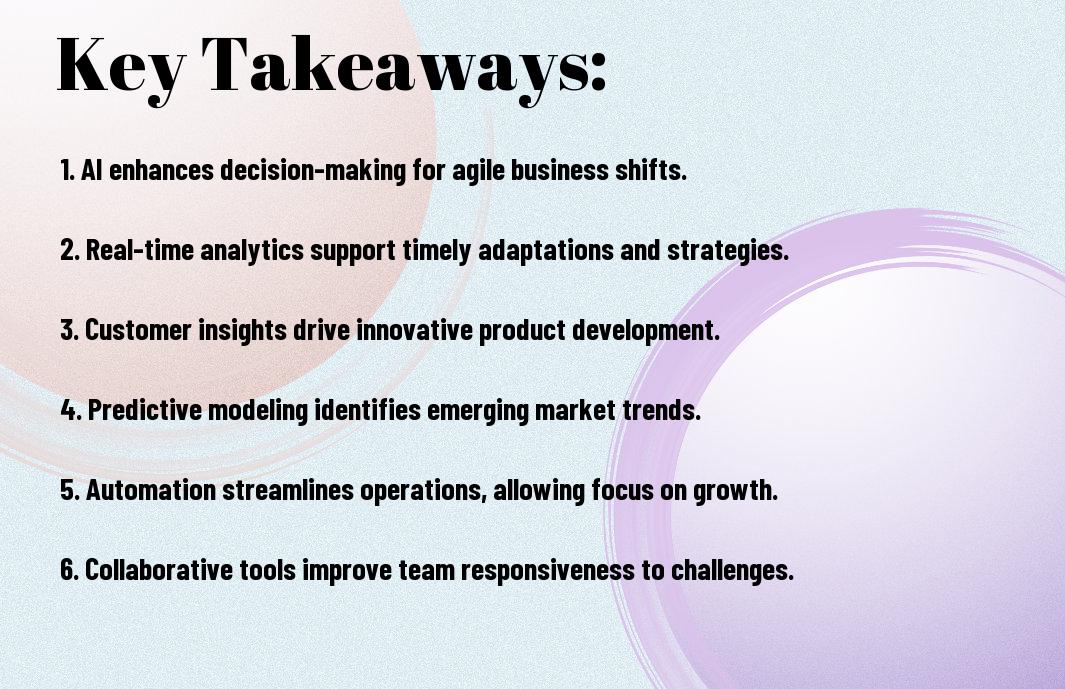As you navigate the ever-changing landscape of entrepreneurship, your ability to adapt and pivot is key to success. You face numerous challenges, from shifting market trends to unexpected setbacks, and your capacity to respond effectively is vital. With the help of artificial intelligence (AI), you can now analyze data, identify patterns, and make informed decisions to drive your business forward, allowing you to stay ahead of the curve and thrive in a competitive environment.
Key Takeaways:
- The ability to pivot is a key factor in an entrepreneur’s success, and AI can play a significant role in identifying opportunities for adaptation and guiding the pivot process.
- AI-powered tools can help entrepreneurs analyze market trends, customer behavior, and competitor activity, providing valuable insights that inform pivot decisions.
- By leveraging AI-driven data analysis, entrepreneurs can test and validate new ideas quickly, reducing the risk associated with pivoting and increasing the likelihood of success.
- AI can also facilitate communication and collaboration among team members, stakeholders, and customers, ensuring a smooth transition during a pivot and maintaining trust and support.
- Embracing AI as a pivot enabler can give entrepreneurs a competitive edge, allowing them to respond rapidly to changing market conditions and stay ahead of the competition in a rapidly evolving business landscape.

The Entrepreneurial Crossroads
For entrepreneurs, navigating the ever-changing business landscape can be daunting, and you often find yourself at a crossroads, unsure of which path to take. Your ability to adapt and pivot will determine your success, and AI can be a valuable tool in this process.
Recognizing Market Shifts
Upon closer examination of your industry, you’ll notice subtle changes in market trends and consumer behavior, signaling a need to adjust your strategy. Your awareness of these shifts will enable you to make informed decisions and stay ahead of the competition.
The Cost of Standing Still
For your business to thrive, you must be willing to evolve and innovate, as standing still can lead to stagnation and decline. Your competitors are likely leveraging AI to drive growth, and you must consider the potential consequences of not doing the same.
Market conditions are constantly evolving, and your failure to adapt can result in lost opportunities and revenue. You must be proactive in assessing your business and making adjustments as needed, using AI to inform your decisions and drive innovation, ultimately ensuring your long-term success.
AI as the Modern Compass
Any entrepreneur knows that navigating the business landscape can be challenging. AI serves as your guide, providing valuable insights to inform your decisions and drive growth.
Predictive Analytics for Decision-Making
Decisively, you can leverage AI-powered predictive analytics to make informed choices, anticipating market trends and optimizing your strategy for success.
Competitive Intelligence Systems
After implementing AI-driven competitive intelligence systems, you gain a deeper understanding of your market and competitors, enabling you to stay ahead of the curve.
In addition, these systems allow you to analyze large amounts of data, identifying patterns and trends that might otherwise go unnoticed, and providing you with a competitive edge in your industry, enabling you to make strategic decisions and drive your business forward.
Strategic Pivot Frameworks
Not all pivots are created equal, and having a framework in place can help you navigate the process with ease, ensuring your business stays on track and adapts to changing market conditions.
The 70/30 Principle
Beneath the surface of a successful pivot lies a careful balance of resources, with 70% dedicated to core operations and 30% allocated to exploration and innovation, allowing you to test new ideas without jeopardizing your existing business.
Minimum Viable Pivot
Across various industries, entrepreneurs have found success by implementing a minimum viable pivot, which involves making small, incremental changes to your business model or product, allowing you to test and refine your approach before making larger investments.
To execute a minimum viable pivot, you’ll need to identify areas of your business that are ripe for innovation, and then make targeted adjustments, gathering feedback and data to inform your next steps, this approach enables you to mitigate risk while still driving growth and innovation in your business, allowing you to stay agile and responsive to changing market conditions, and ultimately, achieve your goals.

Technology Integration Points
Keep in mind that integrating AI into your business operations can be a game-changer, allowing you to adapt and thrive in a rapidly changing market, and it’s imperative to identify the right technology integration points to maximize your benefits.
Customer Feedback Automation
Alongside your existing systems, you can leverage AI to automate customer feedback, enabling you to gather and analyze data more efficiently, and make informed decisions to improve your products and services, which will help you to better serve your customers and stay ahead of the competition.
Rapid Prototype Testing
Following your initial idea, you can utilize AI to rapidly test and validate your prototypes, allowing you to refine your products and services, and get them to market faster, which will give you a competitive edge and help you to achieve your business goals.
It is worth noting that rapid prototype testing with AI enables you to simulate various scenarios, anticipate potential pitfalls, and make data-driven decisions, which will help you to de-risk your product development process and ensure that your final product meets your customers’ needs and expectations, allowing you to achieve greater success and growth in your business.
Resource Reallocation
Now that you’ve identified areas for improvement, it’s time to reallocate your resources. You can use AI to analyze your budget, talent, and operations to determine the best course of action. By leveraging AI-driven insights, you can make data-driven decisions to optimize your resources and drive growth.
AI-Driven Budget Optimization
About your budget, AI can help you identify areas of inefficiency and provide recommendations for optimization. You can use AI tools to analyze your spending patterns, identify trends, and make predictions about future expenses, allowing you to make informed decisions about your budget.
Talent Redistribution Models
Redistributing your talent effectively is key to successful pivoting. You can use AI to analyze your team’s skills and strengths, and identify areas where they can be better utilized. By doing so, you can ensure that your talent is being used efficiently and effectively.
Considering your talent redistribution models, you can use AI to identify skills gaps and provide training recommendations to upskill your team. You can also use AI to analyze your team’s workload and identify areas where automation or outsourcing may be beneficial, allowing you to free up resources and focus on high-priority tasks. By leveraging AI-driven talent redistribution models, you can optimize your team’s performance and drive business growth.
Measuring Pivot Success
Your ability to measure the success of your pivot is necessary to understanding its impact on your business. You need to track key metrics to determine whether your pivot is working or if you need to make further adjustments.
Key Performance Indicators
Successfully identifying the right metrics is vital to evaluating your pivot’s effectiveness. You will need to monitor metrics such as revenue growth, customer acquisition, and retention rates to gauge the success of your pivot.
Iteration Timelines
Prior to establishing a timeline for your pivot, you should consider the complexity of the changes you are making and the resources required to implement them. You will need to set realistic deadlines and milestones to ensure a smooth transition.
But as you work through your iteration timelines, you will likely encounter unexpected challenges and setbacks. You should be prepared to adapt your timeline as needed, and prioritize open communication with your team and stakeholders to ensure everyone is aligned with the revised plan, allowing you to adjust your strategy and make data-driven decisions to drive your business forward.
Summing up
On the whole, you now understand how AI helps your business adapt to changing circumstances. You can leverage AI to analyze your market, identify areas for improvement, and make data-driven decisions to pivot your strategy. By embracing AI, you can stay ahead of the competition and drive your business forward, increasing your chances of success in an ever-changing entrepreneurial landscape, and ultimately, achieving your goals with your adapted business strategy.
FAQ
Q: What is the concept of pivoting in entrepreneurship and how does AI play a role in it?
A: The concept of pivoting in entrepreneurship refers to the ability of a business to adjust its strategy, product, or service in response to changes in the market, customer needs, or other external factors. AI helps entrepreneurs adapt and thrive by providing them with data-driven insights and predictive analytics, enabling them to make informed decisions about when and how to pivot. With AI-powered tools, entrepreneurs can analyze market trends, customer behavior, and competitor activity, identifying opportunities to pivot and stay ahead of the competition.
Q: How can AI assist entrepreneurs in identifying areas where they need to pivot their business strategy?
A: AI can assist entrepreneurs in identifying areas where they need to pivot their business strategy by analyzing large amounts of data from various sources, such as social media, customer feedback, and market research. AI-powered tools can help entrepreneurs identify patterns and trends that may indicate a need to pivot, such as declining sales, changing customer preferences, or emerging competitors. Additionally, AI can provide entrepreneurs with recommendations for potential pivot strategies based on industry benchmarks, best practices, and successful case studies.
Q: What are some examples of how AI has helped entrepreneurs successfully pivot their businesses and achieve success?
A: There are many examples of how AI has helped entrepreneurs successfully pivot their businesses and achieve success. For instance, AI-powered chatbots have enabled companies to pivot from traditional customer support models to more efficient and personalized online support systems. Similarly, AI-driven market analysis has helped entrepreneurs identify new business opportunities and pivot their product or service offerings to meet emerging customer needs. Furthermore, AI-powered predictive analytics has enabled entrepreneurs to anticipate and prepare for potential disruptions, such as changes in market trends or unexpected competitor activity, allowing them to pivot their strategy and stay ahead of the competition.



